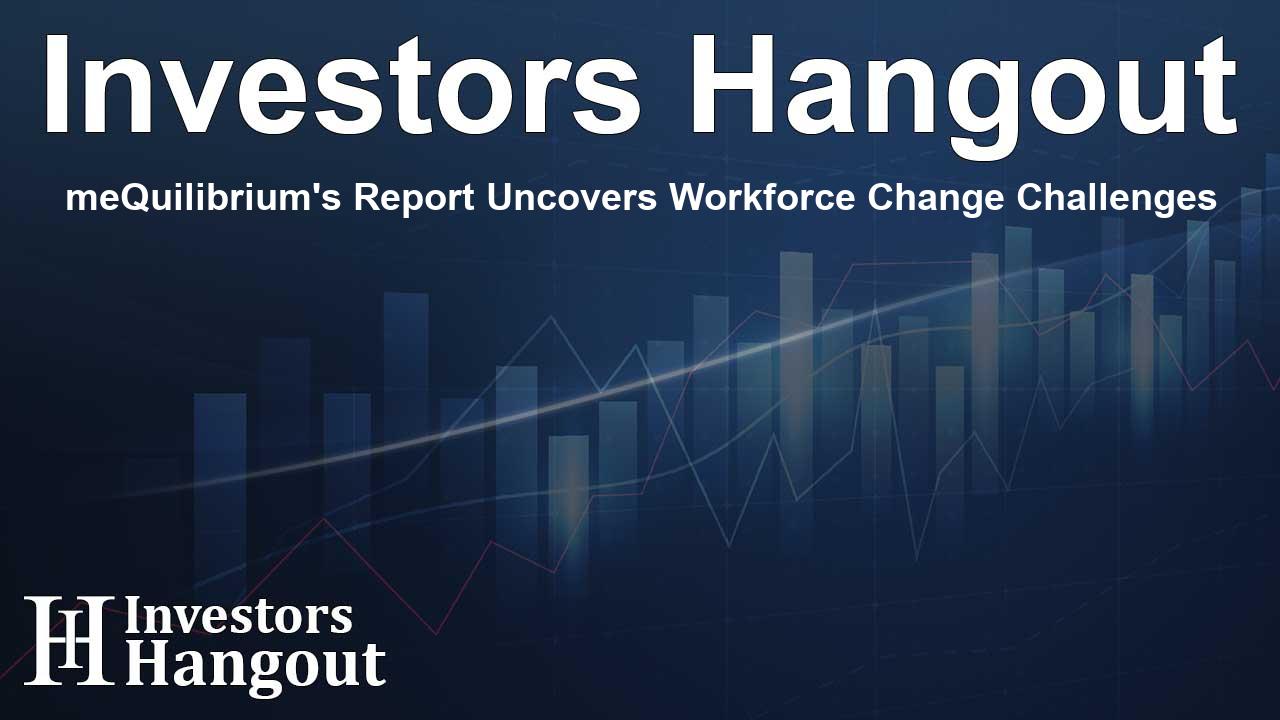meQuilibrium's Report Uncovers Workforce Change Challenges

Understanding Workforce Change Readiness
In a world where change is constant, readiness is paramount. A recent study from meQuilibrium (NASDAQ: COOT) highlights the key challenges organizations face in preparing their workforce for change. With the report analyzing responses from a significant pool of employees and HR executives, it sheds light on critical issues affecting workplace dynamics and employee well-being.
Dissecting Change Readiness Among Employees
The findings reveal a striking divide in change readiness across different employee groups. While HR executives demonstrated high emotional composure and clarity of goals, other groups lagged behind. For instance, managers displayed concerns over their ability to manage change effectively, with nearly a quarter feeling uncertain about how to navigate through transitions. Furthermore, individual contributors expressed more significant anxiety about changes, indicating a pressing need for effective change management strategies.
Practical Skills for Resilience
Organizations that actively equip employees with essential resilience skills — such as emotional control and stress management — can significantly enhance their change readiness. By fostering an environment that promotes these skills, organizations not only prepare employees for future changes but also empower managers to be more effective in their roles.
The Gen Z Workforce: A Unique Challenge
Turning our focus to generational differences, the report highlights a concerning trend among Gen Z employees, who now surpass Baby Boomers in the workforce. Despite their familiarity with rapid changes, they experience significantly higher levels of anxiety related to changes compared to older generations. Understanding and addressing these unique challenges facing Gen Z will be pivotal for organizations aiming to build a resilient workforce.
Addressing the Remote Work Gap
In the past, remote work was seen as a significant advantage for employee well-being. However, the current study makes clear that this advantage has diminished due to pervasive stressors such as economic uncertainties and increasing workloads. Both remote and on-site workers now face similar challenges, indicating that changes in workplace dynamics are affecting morale across the board.
Psychosocial Risks: A Widespread Concern
One of the most alarming findings from the report was the prevalence of psychosocial risks in the workforce. More than half of the respondents reported experiencing at least one significant psychosocial hazard in their work environment. Issues such as the struggle to receive support from supervisors and perceived unfairness in workload distribution highlight critical areas for improvement.
The Manager's Dilemma
Managers, pivotal to mitigating these risks, face a paradox. They encounter higher demands and emotional strain compared to their teams, often receiving less support from upper management. Addressing this discrepancy is vital to prevent burnout and high turnover rates among those responsible for leading others.
Strategies for Navigating Change
To navigate these challenges, meQuilibrium offers several key recommendations for organizations, emphasizing the importance of a proactive approach to change management:
- Bridging the Change Readiness Gap: Establish clear communication channels that enable feedback between leadership and employees.
- Empowering Managers: Equip managers with the necessary training and resources to handle psychosocial risks effectively.
- Focusing on Resilience: Invest in resilience development programs that foster essential skills in employees.
- Assessing Psychosocial Risks: Regularly evaluate the psychosocial climate within the organization to identify potential hazards.
- Supporting Gen Z: Develop targeted programs that help Gen Z employees build resilience skills.
As clearly articulated by Jan Bruce, the CEO of meQuilibrium, the ability to manage change is necessary for success. Organizations must shift from merely managing change to actively preparing their teams to thrive amidst transformations.
Frequently Asked Questions
What is the main focus of the meQuilibrium report?
The report primarily focuses on workforce change readiness and the psychosocial risks affecting employee well-being.
Who conducted the study analyzed in the report?
The study was conducted by meQuilibrium, utilizing survey responses from a significant number of employees and HR executives.
What are some challenges faced by Gen Z employees according to the report?
Gen Z employees face higher anxiety levels regarding change and struggle more with motivation and burnout compared to older generations.
How can organizations enhance change readiness?
Organizations can enhance change readiness by developing resilience skills in employees and establishing clear communication channels.
Why is manager support crucial in mitigating psychosocial risks?
Managers are key in guiding teams through change, and without proper support, they face increased pressure that can lead to burnout and high turnover rates.
About The Author
Contact Dominic Sanders privately here. Or send an email with ATTN: Dominic Sanders as the subject to contact@investorshangout.com.
About Investors Hangout
Investors Hangout is a leading online stock forum for financial discussion and learning, offering a wide range of free tools and resources. It draws in traders of all levels, who exchange market knowledge, investigate trading tactics, and keep an eye on industry developments in real time. Featuring financial articles, stock message boards, quotes, charts, company profiles, and live news updates. Through cooperative learning and a wealth of informational resources, it helps users from novices creating their first portfolios to experts honing their techniques. Join Investors Hangout today: https://investorshangout.com/
The content of this article is based on factual, publicly available information and does not represent legal, financial, or investment advice. Investors Hangout does not offer financial advice, and the author is not a licensed financial advisor. Consult a qualified advisor before making any financial or investment decisions based on this article. This article should not be considered advice to purchase, sell, or hold any securities or other investments. If any of the material provided here is inaccurate, please contact us for corrections.
